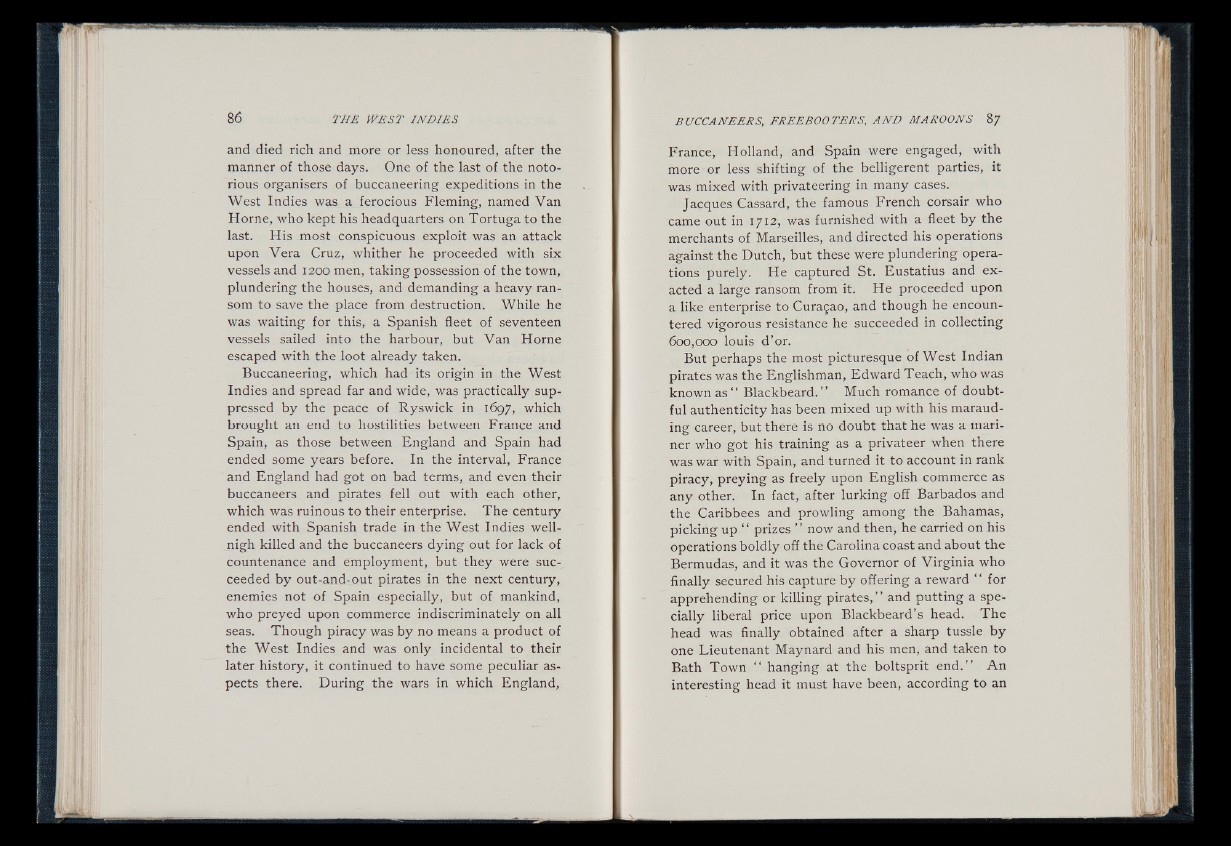
and died rich and more or less honoured, after the
manner of those days. One of the last of the notorious
organisers of buccaneering expeditions in the
West Indies was a ferocious Fleming, named Van
Horne, who kept his headquarters on Tortuga to the
last. His most conspicuous exploit was an attack
upon Vera Cruz, whither he proceeded with six
vessels and 1200 men, taking possession of the town,
plundering the houses, and demanding a heavy ransom
to save the place from destruction. While he
was waiting for this, a Spanish fleet of seventeen
vessels sailed into the harbour, but Van Horne
escaped with the loot already taken.
Buccaneering, which had its origin in the West
Indies and spread far and wide, was practically suppressed
by the peace of Ryswick in 1697, which
brought an end to hostilities between France and
Spain, as those between England and Spain had
ended some years before. In the interval, France
and England had got on bad terms, and even their
buccaneers and pirates fell out with each other,
which was ruinous to their enterprise. T he century
ended with Spanish trade in the West Indies well-
nigh killed and the buccaneers dying out for lack of
countenance and employment, but they were succeeded
by out-and-out pirates in the next century,
enemies not of Spain especially, but of mankind,
who preyed upon commerce indiscriminately on all
seas. Though piracy was by no means a product of
the West Indies and was only incidental to their
later history, it continued to have some peculiar aspects
there. During the wars in which England,
France, Holland, and Spain were engaged, with
more or less shifting of the belligerent parties, it
was mixed with privateering in many cases.
Jacques Cassard, the famous French corsair who
came out in 1712, was furnished with a fleet by the
merchants of Marseilles, and directed his operations
against the Dutch, but these were plundering operations
purely. He captured St. Eustatius and e x acted
a large ransom from it. He proceeded upon
a like enterprise to Curasao, and though he encountered
vigorous resistance he succeeded in collecting
600,000 louis d ’or.
But perhaps the most picturesque of West Indian
pirates was the Englishman, Edward Teach, who was
known a s “ Blackbeard.’ ’ Much romance of doubtful
authenticity has been mixed up with his marauding
career, but there is no doubt o ' that he was a mariner
who got his training as a privateer when there
was war with Spain, and turned it to account in rank
piracy, preying as freely upon English commerce as
any other. In fact, after lurking off Barbados and
the Caribbees and prowling among the Bahamas,
picking up “ prizes ” now and then, he carried on his
operations boldly off the Carolina coast and about the
Bermudas, and it was the Governor of Virginia who
finally secured his capture by offering a reward “ for
apprehending or killing pirates,” and putting a specially
liberal price upon Blackbeard’s head. T he
head was finally obtained after a sharp tussle by
one Lieutenant Maynard and his men, and taken to
Bath Town “ hanging at the boltsprit end .” A n
interesting head it must have been, according to an